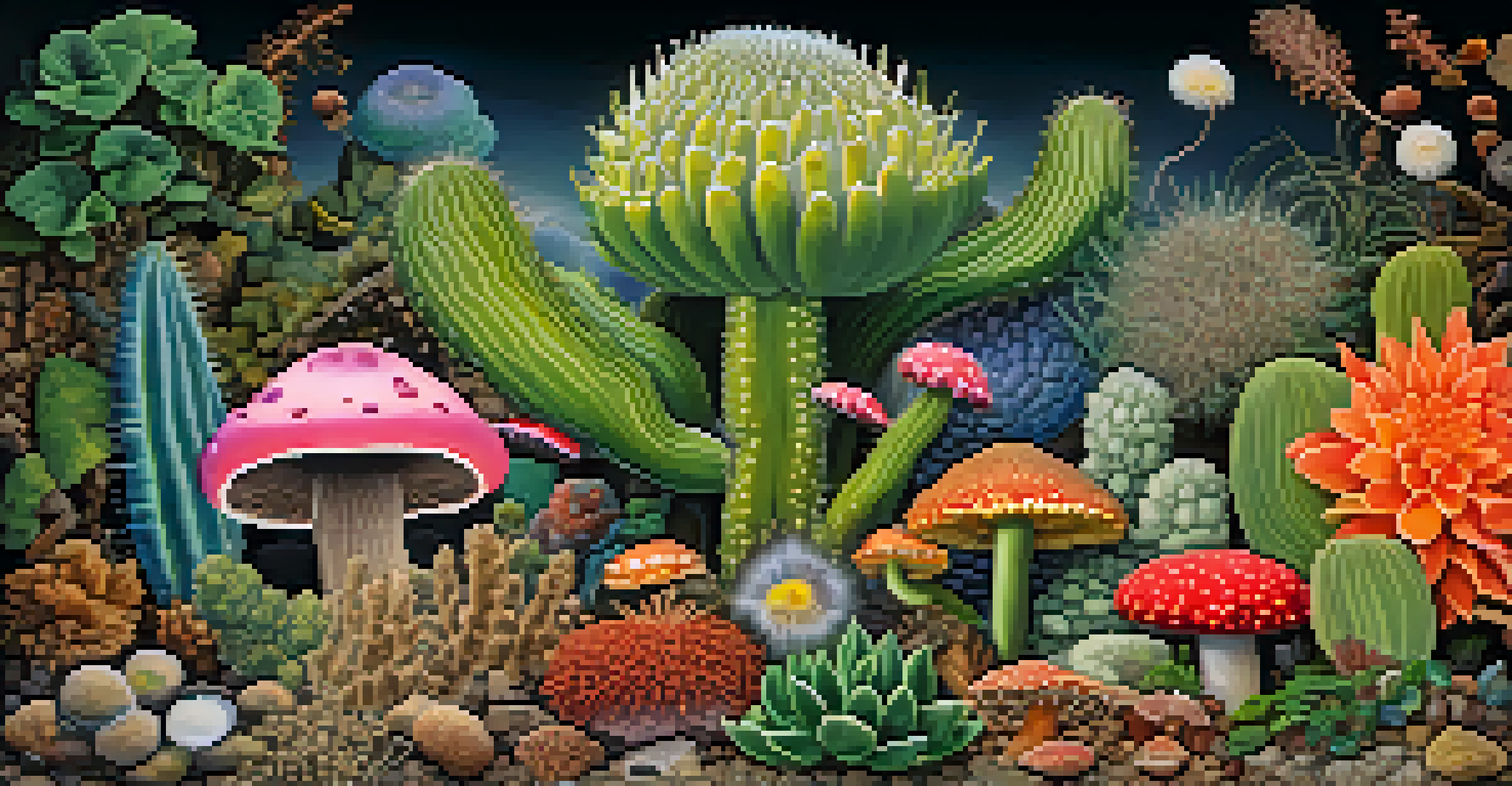Legalization of Entheogens: Impacts on Mental Health Care

Understanding Entheogens and Their Historical Use
Entheogens are substances that induce spiritual or mystical experiences, often derived from plants or fungi. Historically, cultures around the world have used these substances in rituals and healing practices, highlighting their deep-rooted significance in human history. For example, indigenous populations in the Americas have utilized peyote and psilocybin mushrooms for centuries as part of sacred ceremonies. Understanding this historical context sets the stage for their potential role in modern mental health care.
The greatest discovery of my generation is that a human being can alter his life by altering his attitude.
As we move into contemporary discussions about mental health, entheogens are gaining renewed interest for their therapeutic properties. Recent studies suggest they may help treat conditions such as depression, anxiety, and PTSD, offering an alternative to conventional pharmaceuticals. This shift is not merely academic; it reflects a growing recognition of the limitations of traditional mental health treatments and the need for innovative solutions.
In light of this, it’s essential to consider how these substances could be integrated into modern therapeutic practices. By respecting their historical significance and carefully studying their effects, healthcare professionals can create informed frameworks that prioritize safety and efficacy. This approach can help bridge the gap between ancient wisdom and contemporary health care.
The Science Behind Entheogens and Mental Health
Research into entheogens has revealed intriguing insights into their impact on the brain. Substances like psilocybin and ayahuasca have been shown to promote neuroplasticity, which aids in the brain's ability to reorganize itself and form new connections. This could potentially lead to breakthroughs in treating mental health disorders that have long resisted conventional therapies.

Moreover, entheogens can facilitate profound psychological experiences that allow individuals to confront and process trauma. For instance, studies have indicated that psilocybin therapy can significantly reduce symptoms of depression and anxiety, often after just a few sessions. This suggests that the therapeutic potential of these substances could revolutionize how we approach mental health treatment.
Entheogens' Historical Significance
Entheogens have been used for centuries in rituals and healing, highlighting their deep roots in human culture.
Understanding the science behind these effects is crucial for legitimizing their use in therapeutic settings. As more clinical trials and research emerge, the evidence supporting entheogenic therapy continues to grow. This scientific backing can help policymakers make informed decisions regarding legalization and regulation, ultimately benefiting those in need of mental health care.
Current Legal Landscape of Entheogens
The legal status of entheogens varies widely across the globe, with some countries embracing them while others maintain strict prohibitions. In the United States, for example, cities like Denver and Oakland have decriminalized psilocybin mushrooms, signaling a shift in public perception. However, federal laws remain stringent, creating a patchwork of regulations that complicate access and research.
We are all just walking each other home.
This legal landscape poses challenges for both patients seeking treatment and researchers looking to study these substances. The prohibition of entheogens can stifle innovation and limit the development of potentially life-saving therapies. As more jurisdictions recognize the therapeutic benefits of these substances, there’s a growing push for reevaluation of their legal status.
Navigating this complex legal terrain is essential for advancing mental health care options. Advocates argue that legalizing entheogens can lead to more robust research and a better understanding of their therapeutic potential. As discussions around legalization continue, it’s important to involve stakeholders from various sectors, including healthcare professionals and policymakers.
Potential Benefits of Legalizing Entheogens
Legalizing entheogens could unlock numerous benefits for mental health care, including increased accessibility to innovative treatments. Patients often struggle to find effective therapies, and entheogens may offer new hope for those suffering from chronic conditions like depression and PTSD. By making these substances legally available, healthcare providers can offer alternative treatment options that may be more effective for some individuals.
Furthermore, legalization can foster a safer environment for use, minimizing the risks associated with unregulated substances. In a controlled setting, trained professionals can guide patients through their experiences, ensuring safety and support during potentially transformative sessions. This approach could mitigate the dangers of misuse and ensure that patients receive the full therapeutic benefits.
Therapeutic Potential of Entheogens
Research indicates that substances like psilocybin may effectively treat mental health conditions such as depression and PTSD.
Additionally, legal access to entheogens can spark further research and clinical trials, enhancing our understanding of their effects on mental health. As more studies emerge, we can develop evidence-based guidelines for their use in therapy. Ultimately, this could lead to a more comprehensive understanding of how entheogens fit into the broader landscape of mental health treatment.
Challenges and Concerns with Legalization
While the potential benefits of legalizing entheogens are significant, it’s important to recognize the challenges and concerns that come with it. One major concern is the risk of misuse or abuse, as not all individuals will approach these substances with the necessary caution. Education and responsible use guidelines will be crucial in mitigating these risks.
Moreover, the stigma surrounding entheogens can hinder their acceptance in mainstream medicine. Many people still associate these substances with recreational use and counterculture movements, which can overshadow their therapeutic potential. It’s vital for public discourse to shift towards a more nuanced understanding of entheogens and their place in mental health care.
Lastly, the regulatory framework surrounding entheogen legalization needs careful consideration. Policymakers must balance public safety with the need for innovative treatment options. Creating a comprehensive regulatory structure that addresses these concerns can help ensure that the benefits of legalization are realized while minimizing potential pitfalls.
The Role of Mental Health Professionals in This Shift
Mental health professionals will play a pivotal role in the integration of entheogens into treatment paradigms. As these substances become more accepted, therapists and psychiatrists must educate themselves about their effects and therapeutic potential. This knowledge will empower them to make informed decisions about incorporating entheogenic therapies into their practice.
Furthermore, professionals can help combat stigma by openly discussing the benefits and risks associated with entheogens. By fostering a culture of acceptance and understanding, mental health practitioners can encourage patients to explore these options. This dialogue is essential for creating a supportive environment where individuals feel comfortable considering alternative treatments.
Legalization Challenges Ahead
The path to legalizing entheogens involves navigating complex regulations and addressing public stigma surrounding their use.
Additionally, mental health professionals can advocate for research and policy changes that promote safe and effective use of entheogens. Their expertise will be invaluable in shaping guidelines and best practices as these substances become more mainstream. Ultimately, their involvement is crucial for ensuring that the shift toward entheogenic therapies is grounded in safety, efficacy, and ethical considerations.
The Future of Mental Health Care and Entheogens
The future of mental health care may very well include entheogens as a legitimate treatment option. As societal attitudes continue to evolve, there’s a growing recognition of the need for innovative therapies that address the complexities of mental health disorders. By embracing entheogens, we could see a transformation in how mental health care is delivered and perceived.
This shift could lead to more personalized treatment plans that consider individual experiences and needs. For some patients, traditional medications may not suffice, and entheogens could offer a tailored approach to healing. The integration of these substances into mental health care could foster a more holistic understanding of mental wellness.

Moreover, as research expands and success stories emerge, we may witness a cultural shift that normalizes the use of entheogens for therapeutic purposes. This could encourage more individuals to seek help, ultimately reducing the stigma surrounding mental health issues. The potential for entheogens to revolutionize mental health care is immense, and the journey toward that future is just beginning.